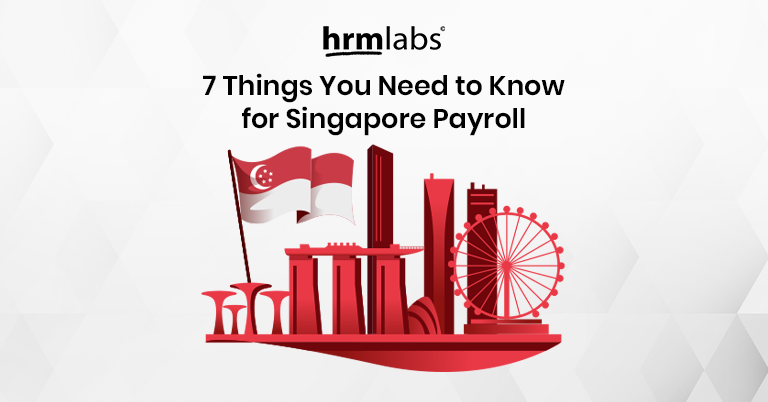When compared to other nations, Singapore’s payroll operations are very clear and easy to understand, making it a highly attractive option for companies looking to settle in. However, there are specific laws and regulations to payroll in Singapore that must be adhered to when conducting payroll activities.
There are many businesses with offices in Singapore that employ both residents and non-residents. Depending on the employee’s residency status, there are different considerations to make, such as CPF payments, maternity pay, leave, income tax, and the foreign worker’s levy. Therefore, managing your payroll can take a lot of time and be challenging. There is an option to outsource payroll processing to qualified service providers, ensuring your business accuracy and compliance.

Singapore Payroll Process
Even though Singapore’s payroll processing is straightforward and clear, it must be carefully managed because it is subject to several rules and regulations and must take into account the status of both resident and non-resident employees. If not handled correctly, it could cause errors and have an impact on payroll accounting, which would lead to false report data for income tax filing.
The CPF, the Skill Development Levy, and the Foreign Workers Levy are among the social security programs that must be paid through the payroll processing in Singapore; however, there are no mandatory monthly withholding obligations for employers in Singapore.
Payroll processing is typically done by employers in Singapore while taking into account performance reviews, year-end incentives, medical leave, statutory claims, etc.
Processing payroll overall includes all of these steps:
1. Setup for payroll
2. Collecting and processing raw data
3. Payroll processing
4. Pay slip and Payroll Transfer
5. Statutory submission
6. Individual income tax annual report
7. Annual payments, such as bonuses, etc.
Things You Need to Know for Singapore Payroll
To ensure compliance, employers must be aware of the most essential payroll-related regulations. The reputation of the company may also be damaged by oversights, which also could lead to severe penalties. These are the outline of some things you need to know for compliant payroll management
1. Paying the salary at least once a month is required.
Salaries must be paid by employers at least once each month, or more frequently if they so wish. Wage nonpayment is an offense, and it must be resolved within 7 days of the end of the salary period.
2. Basic pay and allowances are included in salary. It excludes travel, subsistence, and housing allowances.
Salary is only compensation for labor performed under a service agreement. In addition to not including housing, food, or travel expenses, it also excludes pension benefits, work-related expenses, and layoff compensation.
3. You must have itemized pay slip.
All companies must now provide itemized pay slips to employees who are protected by the Employment Act as of April 1, 2016. Hard copies or digital versions must include information such as the payment date, basic salary and benefits, overtime pay, salary period, and any deductions made.
4. Accurately calculate overtime pay.
Any work performed after regular working hours is considered overtime (excluding breaks). A worker is limited to 72 hours of overtime each month. You will be required to pay at least 1.5 times the hourly base rate of pay for overtime work. After the wage period’s final day, payment must be given within 14 days.
5. Keep track of your payroll data.
Are you maintaining thorough records of your employees’ employment and pay? Employers are required to maintain such data for every employee in Singapore for two years. After an employee leaves a job, records about them must be preserved for a year.
6. Pay attention to statutory requirements, required levies, and contributions.
Employers are required to make the following monthly contributions in addition to Central Provident Fund (CPF) contributions:
- Ethnic funds such as CDAC, ECF, MBMF and SINDA, which aim at helping the less privileged in the respective ethnic communities;
- Skills Development Levy, which provides you training grants when you send your employees for training;
- CPF contributions for National Servicemen even if they undergo periodic NS trainings. Employers, however, do not have to pay NS men for the days they are away.
- In addition, employers hiring foreigners with Work Permits of S Passes will have to pay monthly levies for each worker.
7. Pay attention to the legal reporting requirements.
Employers must electronically submit their employees’ income information to IRAS by the first of March each year starting with the Year of Assessment 2017 if they have either received notice to file their employment income electronically or (ii) had 10 or more workers employed by them for the entire year.
Additionally, employers with international employees are required to file Form IR21, which requests tax clearance for that personnel, at least one month before the employee leaves Singapore for three months or longer, begins an overseas posting, or terminates his job.
Singapore Payroll Outsource Service
Managing payroll can be frustrating, especially when you’re just starting a company recently and have many other things to take care of. Luckily you can hire professional payroll outsource service to take care of your payroll management. HRMLabs can help you with salary processing, itemized pay slip, ensuring you pay employees on time, and many more. Click here to book a consultation session with our teams this week.



